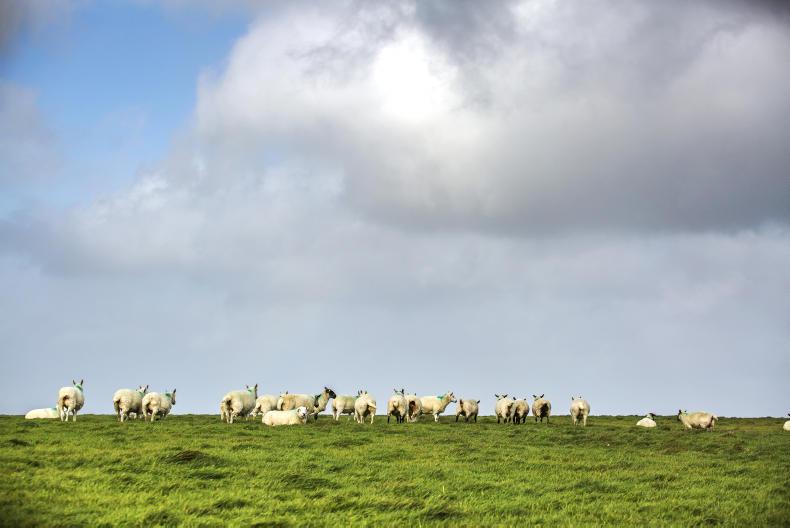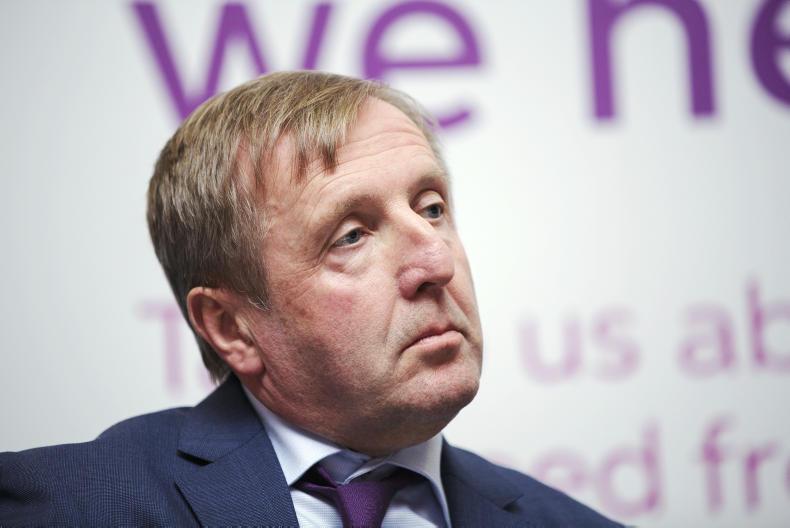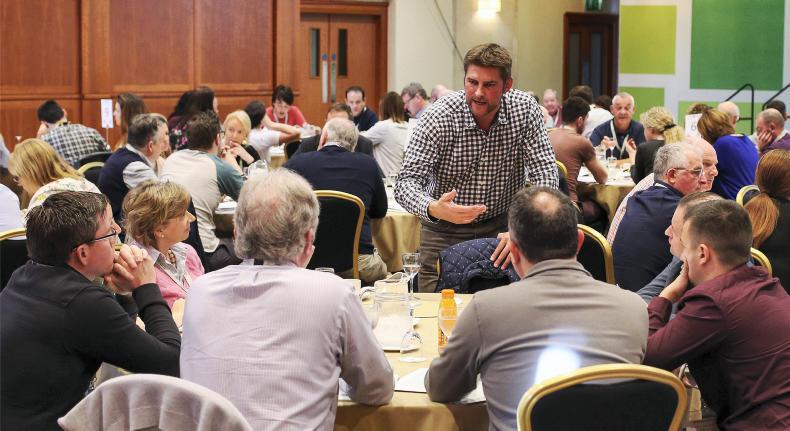On Sunday, the Citizens’ Assembly overwhelmingly adopted a recommendation that “there should be a tax on greenhouse gas emissions from agriculture.
There should be rewards for the farmer for land management that sequesters carbon.
Farmers would still receive payments if they did not keep the animals
Any resulting revenue should be re-invested to support climate-friendly agricultural practices.”
The idea came from a presentation to the Assembly by Alan Matthews, professor emeritus of European agricultural policy at Trinity College. One-third of Irish greenhouse gas emissions come from agriculture and projections suggest that these will flatline at best in the next 20 years, while EU targets mandate successive reductions, Matthews said.
Listen to the proposal and analysis in our podcast below:
“The best way to send a signal is a levy or tax on carbon emissions. Conversely, if the farm is sequestering carbon, the farmer should be rewarded,” Prof Matthews said. He said his proposal should not cost the industry any money: taxes levied on carbon-intensive productions such as beef would be “recycled” into a flat area-based payment to all farmers, or support for more climate-friendly businesses, such as forestry.
He argued that, just like feed, veterinary medicines or investment in farm buildings, the cost of carbon emissions should be factored into farmers’ decisions.
Prof Matthews acknowledged that the main effect of his proposal would be to encourage farmers to drop beef production, from which they “do not make money”, he said. “If we put a proper cost on these activities, it would not affect income.
"Farmers would still receive payments if they did not keep the animals – just for a different land use.”
He said his proposal should be implemented “carefully” as farmers face the risks of Brexit and dwindling CAP payments in the coming years.
Prof Matthews acknowledged that it would not be possible to measure emissions on each farm to implement his proposed carbon levy and suggested this could be done at processor level.
What is the
Citizens’ Assembly?
The Citizens’ Assembly was proposed by Fine Gael in late 2015 to consider the issue of how best to legislate on the controversial issue of abortion. Seen by some as a “kick to touch” by Enda Kenny, it was nonetheless brought into being following his re-election as Taoiseach. It sat for the first time last October, with an expanded remit to tackle two other issues – Ireland’s aging population, and making Ireland a leader in tackling climate change.
Who sits on the assembly?
Ninety-nine citizens chosen to fully represent the breadth of Irish society (see page 10) form the assembly, with Justice Mary Laffoy appointed to chair the assembly.
An expert advisory group, made up of five academics from our universities, assisted the chair in selecting the speakers for each session.
Who addressed the assembly?
In addition to Professor Matthews, four other speakers addressed the forum directly on agriculture. They included Professor Gary Lanigan of Teagasc, who specialises in mitigation of gaseous emissions from agriculture, and is part of the team in Teagasc that has made Ireland a global leader in this area.
Longford farmer Andrew McHugh also addressed the assembly. Andrew is one of the farmers participating in the smart farming project, designed to accurately measure and incrementally reduce the carbon footprint on Irish farms.
Organic farmer Tony Garaghy and Iseult Ward, CEO of Foodcloud, a company that is tackling food waste in Ireland, also addressed the session. There was no representative from the processing sector.
Read more
Why a carbon tax would not be effective
Politicians and farmers unite against carbon tax proposal
#'Citizens' Assembly ruling cannot be considered'
On Sunday, the Citizens’ Assembly overwhelmingly adopted a recommendation that “there should be a tax on greenhouse gas emissions from agriculture.
There should be rewards for the farmer for land management that sequesters carbon.
Farmers would still receive payments if they did not keep the animals
Any resulting revenue should be re-invested to support climate-friendly agricultural practices.”
The idea came from a presentation to the Assembly by Alan Matthews, professor emeritus of European agricultural policy at Trinity College. One-third of Irish greenhouse gas emissions come from agriculture and projections suggest that these will flatline at best in the next 20 years, while EU targets mandate successive reductions, Matthews said.
Listen to the proposal and analysis in our podcast below:
“The best way to send a signal is a levy or tax on carbon emissions. Conversely, if the farm is sequestering carbon, the farmer should be rewarded,” Prof Matthews said. He said his proposal should not cost the industry any money: taxes levied on carbon-intensive productions such as beef would be “recycled” into a flat area-based payment to all farmers, or support for more climate-friendly businesses, such as forestry.
He argued that, just like feed, veterinary medicines or investment in farm buildings, the cost of carbon emissions should be factored into farmers’ decisions.
Prof Matthews acknowledged that the main effect of his proposal would be to encourage farmers to drop beef production, from which they “do not make money”, he said. “If we put a proper cost on these activities, it would not affect income.
"Farmers would still receive payments if they did not keep the animals – just for a different land use.”
He said his proposal should be implemented “carefully” as farmers face the risks of Brexit and dwindling CAP payments in the coming years.
Prof Matthews acknowledged that it would not be possible to measure emissions on each farm to implement his proposed carbon levy and suggested this could be done at processor level.
What is the
Citizens’ Assembly?
The Citizens’ Assembly was proposed by Fine Gael in late 2015 to consider the issue of how best to legislate on the controversial issue of abortion. Seen by some as a “kick to touch” by Enda Kenny, it was nonetheless brought into being following his re-election as Taoiseach. It sat for the first time last October, with an expanded remit to tackle two other issues – Ireland’s aging population, and making Ireland a leader in tackling climate change.
Who sits on the assembly?
Ninety-nine citizens chosen to fully represent the breadth of Irish society (see page 10) form the assembly, with Justice Mary Laffoy appointed to chair the assembly.
An expert advisory group, made up of five academics from our universities, assisted the chair in selecting the speakers for each session.
Who addressed the assembly?
In addition to Professor Matthews, four other speakers addressed the forum directly on agriculture. They included Professor Gary Lanigan of Teagasc, who specialises in mitigation of gaseous emissions from agriculture, and is part of the team in Teagasc that has made Ireland a global leader in this area.
Longford farmer Andrew McHugh also addressed the assembly. Andrew is one of the farmers participating in the smart farming project, designed to accurately measure and incrementally reduce the carbon footprint on Irish farms.
Organic farmer Tony Garaghy and Iseult Ward, CEO of Foodcloud, a company that is tackling food waste in Ireland, also addressed the session. There was no representative from the processing sector.
Read more
Why a carbon tax would not be effective
Politicians and farmers unite against carbon tax proposal
#'Citizens' Assembly ruling cannot be considered'










SHARING OPTIONS